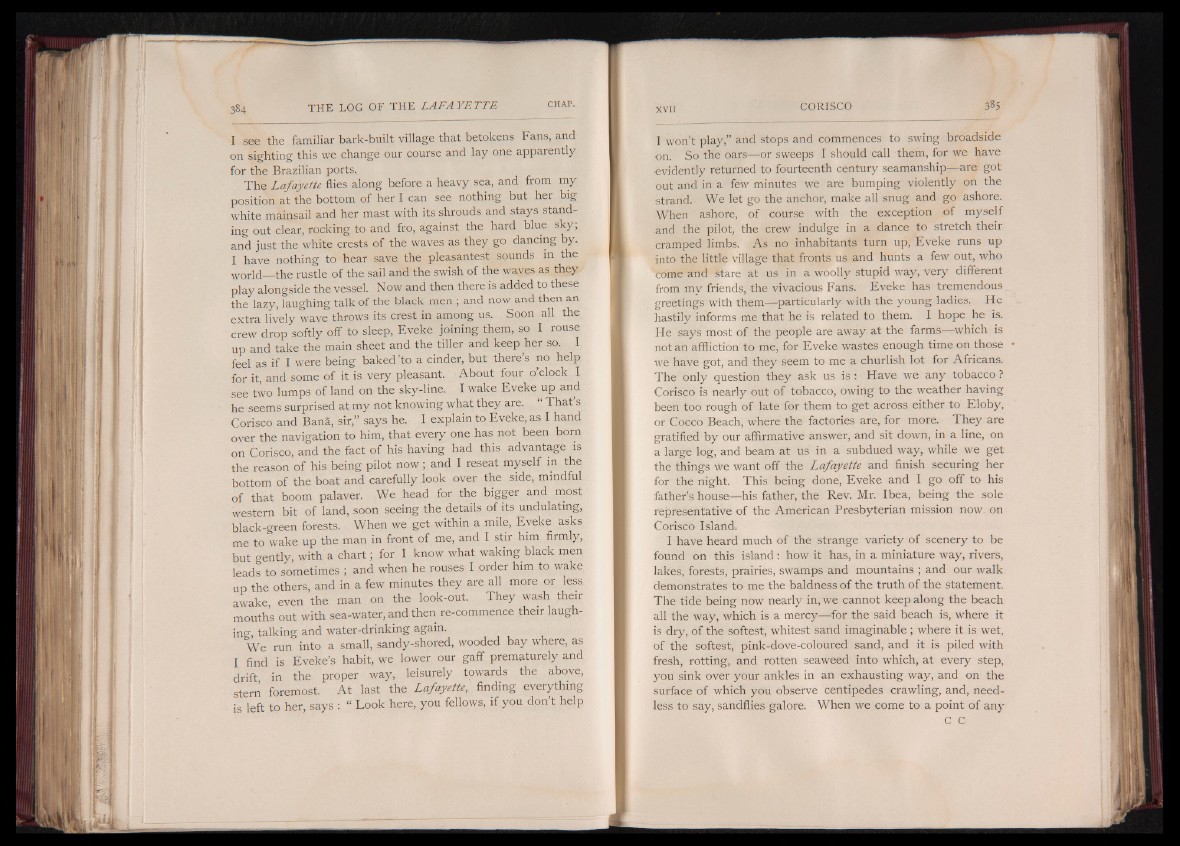
I see the familiar bark-built village that betokens Fans, and
on sighting this we change our course and lay one apparently
for the Brazilian ports.
The Lafayette flies along before a heavy sea, and from my
position at the bottom of her I can see nothing but her big
white mainsail and her mast with its shrouds and stays standing
out clear, rocking to and fro, against the hard blue sky;
and just the white crests of the waves as they go dancing by.
I have nothing to hear save the pleasantest sounds in the
world the rustle of the sail and the swish of the waves as they
play alongside the vessel. Now and then there is added to these
the lazy, laughing talk of the black men ; and now and then an
extra lively wave throws its crest in among us. Soon all the
crew drop softly off to sleep, Eveke joining them, so I rouse
up and take the main sheet and the tiller and keep her so. I
feel as if I were being baked'to a cinder, but there’s no help
for it, and some of it is very pleasant. About four o’clock I
see two lumps of land on the sky-line. I wake Eveke up and
he seems surprised at my not knowing what they are. “ That s
Corisco and Bana, sir,” says he. I explain to Eveke, as I hand
over the navigation to him, that every one has not been born
on Corisco, and the fact of his having had this advantage is
the reason of his being pilot now; and I reseat myself in the
bottom of the boat and carefully look over the side, mindful
of that boom palaver. We head tor the bigger and most
western bit of land, soon seeing the details of its undulating,
black-green forests. When we get within a .mile, Eveke asks
me to wake up the man in front of me, and I stir him firmly,
but gently, with a chart; for I know what waking black men
leads to sometimes ; and when he rouses I order him to wake
up the others, and in a few minutes they are all more or less,
awake, even the man on the look-out. They wash their
mouths out with sea-water, and then re-commence their laughing
talking and water-drinking again.
We run into a small, sandy-shored, wooded bay where, as
I find is Eveke’s habit, we lower our gaff prematurely and
drift in the proper way, leisurely towards the above,
stern foremost. A t last the Lafayette, finding everything
is left to her, says : “ Look here, you fellows, if you don’t help
I won’t play,” and stops and commences to swing broadside
on. So the oars— or sweeps I should call them, for we have
evidently returned to fourteenth century seamanship— are got
out and in a few minutes we are bumping violently on the
strand. We let go the anchor, make all snug and go ashore.
When ashore, of course with the exception of myself
and the pilot, the crew indulge in a dance to stretch their
cramped limbs. As no inhabitants turn up, Eveke runs up
into the little village that fronts us and hunts a few out, who
come and stare at us in a woolly stupid way, very different
from mv friends, the vivacious Fans. Eveke has tremendous
greetings with them— particularly with the young ladies. He
hastily informs me that he is related to them. I hope he is.
He says most of the people are away at the farms—¿which is
not an affliction to me, for Eveke wastes enough time on those
we have got, and they seem to me a churlish lot for Africans.
The only question they ask us is : Have we any tobacco ?
Corisco is nearly out of tobacco, owing to the weather having
been too rough of late for them to get across either to Eloby,
or Cocco Beach, where the factories are, for more. They are
gratified by our affirmative answer, and sit down, in a line, on
a large log, and beam at us in a subdued way, while we get
the things we want off the Lafayette and finish securing her
for the night. This being done, Eveke and I go off to his
father’s house— his father, the Rev. Mr. Ibea, being the sole
representative of the American Presbyterian mission now. on
Corisco Island.
I have heard much of the strange variety of scenery to be
found on this island : how it has, in a miniature way, rivers,
lakes, forests, prairies, swamps and mountains ; and our walk
demonstrates to me the baldness of the truth of the statement.
The tide being now nearly in, we cannot keep along the beach
•all the way, which is a mercy— for the said beach is, where it
is dry, of the softest, whitest sand imaginable ; where it is wet,
of the softest, pink-dove-coloured sand, and it is piled with
fresh, rotting, and rotten seaweed into which, at every step,
you sink over your ankles in an exhausting way, and on the
surface of which you observe centipedes crawling, and, needless
to say, sandflies galore. When we come to a point of any
C C